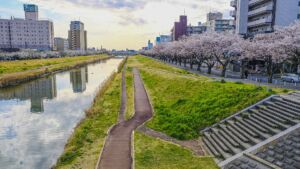By Nancy Aird
March 3, 2011, marks the tenth anniversary of the Great East Japan Earthquake, Tsunami, and Fukushima Daiichi Nuclear Disaster. Japan faced this experience with “BOSAI,” a science that can save your life. Nationally this cultural idea of preparedness /resiliency evolved from the EDO period experiences of running urban fires. Today the nation is faced yearly with emergency response activation from earthquakes, tsunamis, typhoons, floods, landslides, snow, and volcano eruption. Disaster preparedness is exercised for and handled by all levels of society – national, community, personal, and schools. Check out Japanese insights and lessons for handling emergencies on NHK WORLD NEWS – news and video on demand site.
The site is in English and 16 other languages. You can check the site by going to the On-Demand/Category /Disaster Preparedness for documentaries, clips on crafting survival items, and Audio presentations for foreign language speakers. Some of the video topics covered include: Fostering leaders, Creating Bosai Communities, Staying Connected during Disaster, Flooding, Earthquake, Tsunami, and Urban Windstorm lessons.
https://www3.nhk.or.jp/nhkworld/en/ondemand/category/29/?type=tvEpisode&
The News and Videos Show Japan has Embraced a Culture to Foster the Following:
Seven Skills of Resilience
- Principle 1: Cultivate a Belief in Your Ability to Cope.
- Principle 2: Stay Connected With Sources of Support.
- Principle 3: Talk About What You’re Going Through.
- Principle 4: Be Helpful to Others.
- Principle 5: Activate Positive Emotion.
- Principle 6: Cultivate an Attitude of Survivorship.
- Principle 7: Seek Meaning.
Source: Seven Skills of Resilience Practical ways to enhance well-being in these trying times
psychologytoday.com/us/blog/lifespac-perspectives/202003/seven-skills-resilience


